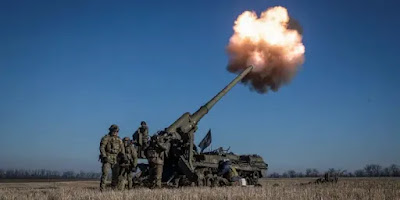Russian-occupied Melitopol is the most logical first strategic target for Ukraine's coming counteroffensive because it leads directly to the Azov Sea - and to splitting Crimea off from the rest of Russia.
Ukraine appears to be sending a message to Russian troops there - as it did at Kherson last fall - in order to make them nervous about what's coming. JL
Isabel Coles reports in the Wall Street Journal:
Explosions were heard in the Russian-occupied city of Melitopol as Kyiv prepares for an offensive this spring. The strikes were the third attack on the city in recent days. On Wednesday, there were explosions in a train depot and a military airstrip. Two days earlier, Russian-installed official Maksym Zubarev was seriously wounded in a car bomb attack. A thrust south to Melitopol makes strategic sense because it could break through Russia’s land bridge and restore Ukraine’s access to the Azov Sea. From (there), Ukrainian forces would be able to strike the Kerch Strait Bridge.Explosions were heard in the Russian-occupied city of Melitopol overnight as Kyiv and its Western allies prepare for an offensive expected to begin in earnest later this spring.
The city’s exiled Mayor Ivan Fedorov said a Russian base near an airfield was struck. Russian-installed occupation authorities in Melitopol said air defenses shot down six missiles fired by U.S.-supplied M142 High Mobility Artillery Rocket System or Himars. Western military analysts have said that Himars rockets probably can’t be intercepted by Russian systems.
The strikes were the third attack on the city in recent days. On Wednesday, there were explosions in the vicinity of a train depot and a military airstrip, Mr. Fedorov said. Two days earlier, Russian-installed official Maksym Zubarev was seriously wounded in an apparent car bomb attack in the city. Kyiv didn’t claim responsibility, but it has stated on several occasions that Ukrainian partisans are working in Russian-occupied areas.
Russian forces seized Melitopol in the early days of the invasion last year, creating a land bridge connecting areas under its control in mainland Ukraine with the Crimean Peninsula, which Russian forces occupied in 2014.
The timing and target of Kyiv’s anticipated military push is closely guarded, but analysts say a thrust south to Melitopol makes strategic sense because it could break through Russia’s land bridge and restore Ukraine’s access to the Azov Sea.
From the north shore of the Azov Sea, Ukrainian forces would potentially be able to strike the Kerch Strait Bridge, which Russia opened in 2018 to connect its mainland to Crimea. The bridge was hit with an explosion in October that seriously damaged its structure and impeded Moscow’s transports to Crimea. Russian teams are still working to repair it.
Mr. Fedorov said this week that Russian forces were mining fields along the front lines in the Zaporizhzhia region surrounding Melitopol as it steels itself for a possible Ukrainian assault on the city. A new assessment by the United Nations and the World Bank estimated the cost of damage done by Russian attacks on Ukraine’s infrastructure at more than $10 billion. The largest share of damage is to the power sector—close to $6.5 billion—while damage to nuclear plants reached about $770 million, according to the assessment. The cost of emergency repairs is estimated to reach $1.2 billion.
On Wednesday, Ukraine’s President Volodymyr Zelensky visited Poland as Kyiv continued to press Western allies for military and financial support.
Meanwhile, Ukrainian forces were fighting to prevent Russia from making further inroads in the east of the country. The General Staff of Ukraine’s Armed Forces said Russian attacks remained focused on the cities of Bakhmut, Avdiivka and Maryinka.
Ukrainian forces, after a series of victories last year, have been on the defensive in recent months. But Russia has made limited gains despite mobilizing an additional 300,000 men last fall.
After months of grueling combat in and around Bakhmut, the leader of the Russian paramilitary Wagner group that is spearheading the assault said earlier this week he had raised a Russian flag near the strategic town’s city hall. Ukrainian forces are still present in the western part of the city, he said.
The battle for Bakhmut, a coal-mining hub in Ukraine’s Donetsk region, has become a pivotal battlefield in the broader war for both Russia and Ukraine.
Moscow has made its capture a core objective, while Ukrainian troops have held out against waves of Russian assaults there for more than six months. The ferocity of the fighting has reduced much of the city to rubble and imbued Bakhmut with as much symbolic as strategic importance, military analysts say.
Ukraine’s commanders have said that their efforts to exhaust Russian forces in Bakhmut could help Ukrainian forces recapture territory elsewhere in the country. Russia’s defense minister has said the city is an important defensive hub for Ukraine, and that capturing it would allow Russian forces to continue advancing in the broader eastern region of Donbas.
The governor of Russia’s Bryansk region said authorities on Thursday had thwarted an attempt by a Ukrainian sabotage group to infiltrate the region, which neighbors Ukraine. Without providing evidence, the governor, Alexander Bogomaz, said on Telegram that Russian armed forces had fired on the group. In early March, Russian authorities said two civilians were killed in an attack in Bryansk that they blamed on Ukrainian saboteurs, an alleged assault in which Ukrainian intelligence said it played no part.



















0 comments:
Post a Comment